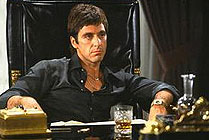|
|
|
|
Scarface
|
 |
|
It is best to see Brian De Palma's version of Scarface on a big, loud screen, where it belongs. De Palma's updated remake of Howard Hawks' 1932 gangster classic is bloody, excessive, outrageous, brilliantly crafted – and it sports an unforgettably high-gear performance from Al Pacino. When it first appeared, the film seemed like a striking departure for De Palma. Gone were the Hitchcockian games with voyeurs, rear windows, doppelgängers and complex stories told from multiple perspectives that characterised his work from Sisters (1972) to Blow Out (1981). Yet, seen today, Scarface is quintessential De Palma – as obsessed as ever with the fragile conditions of male selfhood and power politics. The film begins with documentary footage detailing the wave of Cuban refugees flooding into North America – a political dimension that gives a whole new slant to Hawks' (and Ben Hecht's) original story. Tony (Pacino) quickly realises that crime and murder are his best ways out of the immigrant ghetto. His rise-and-fall as a modern gangster is rendered in a spectacular, garish style. De Palma takes every opportunity to heighten the fashions and musical crazes of the '70s as a counterpoint to all the bloodshed and betrayal. Commentators rushed to dub this take on Scarface (scripted by Oliver Stone) the first postmodern gangster epic. This is because Tony not only fits the mythical role of the anti-hero who suffers so that a filthy, capitalist society can keep running; he can also recognise and talk about that fact. Yet, for all its dazzling self-consciousness, this is, at its primary level, a grand narrative in the old style – and its cathartic, apocalyptic kick is tremendous. De Palma takes to a new, melodramatic extreme one of the classic themes of the gangster genre: namely, the hero's obsession with territorial control, and the inexorable loss of this power. Tony dreams of absolute command: over his own body, over the hearts and allegiances of those close to him, and over the turf of his criminal empire. But, after many mountains of cocaine, he cannot even see, on his own security cameras, those who come to kill him. Scarface was decried by many critics on its initial release as a vulgar, nasty, brutish, obscene, politically insensitive work. And so it is – that's precisely why it is one of the great movies of the '80s. More than any subsequent disaster film, De Palma's masterpiece gives us the subversive thrill of seeing a social microcosm explode into a thousand fragments – and all the while, a blimp flies above, heralding a bitterly mocking slogan in neon: "The World is Yours". MORE De Palma: Carlito's Way, Carrie, Casualties of War, Mission to Mars, Mission: Impossible, Raising Cain, Snake Eyes, Sisters © Adrian Martin January 1998 |
![]()